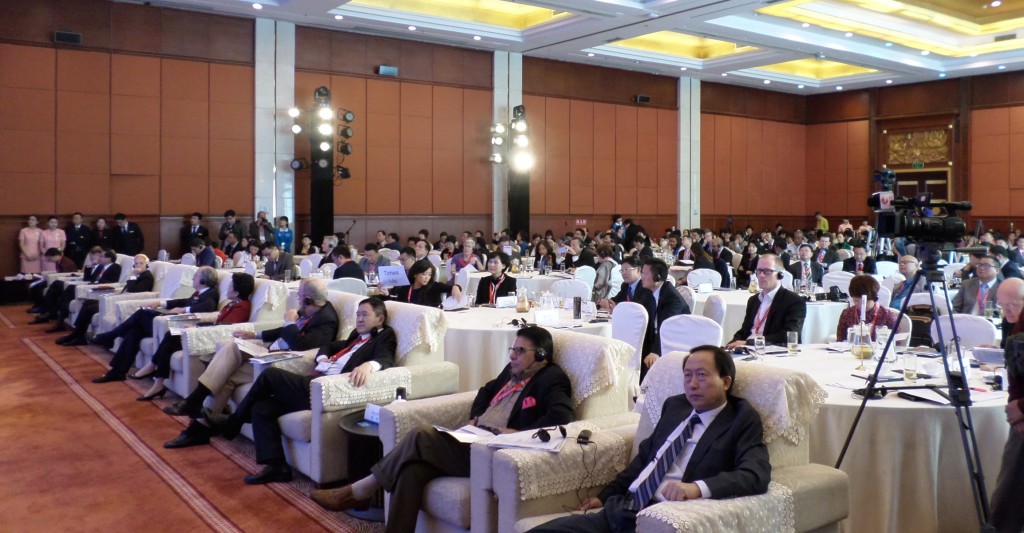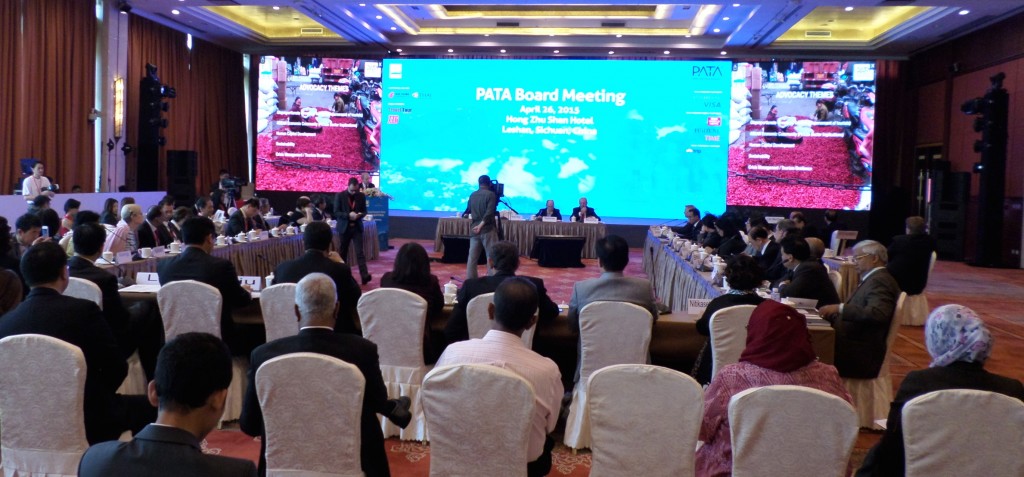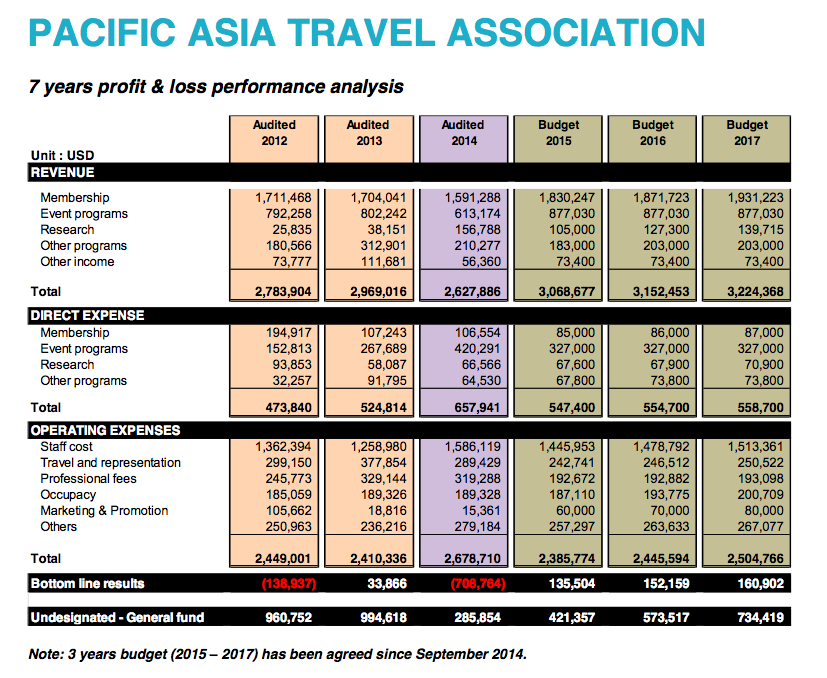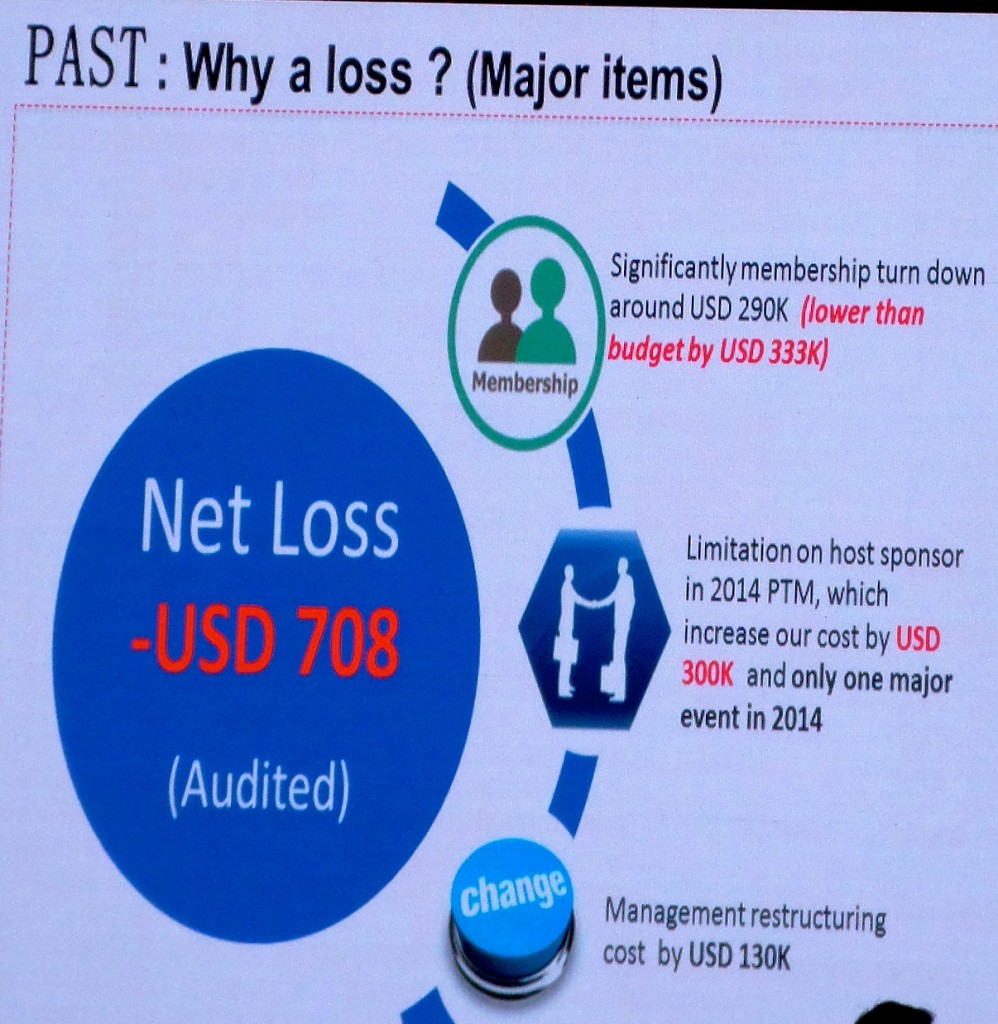
30 Apr, 2015
PATA bottoms out, plans to rebuild chapters as part of U-shaped recovery plan
LESHAN, China – When immediate past PATA Chairman Scott Supernaw opened the Chapters Colloquium at the PATA annual summit on 25 April, he made a stunning public admission. Referring to a restructuring of chapters now under way, he took a page from PATA history, saying, “I personally think we made a mistake that we forced chapters to join the headquarters, and clearly that did not work well.”
 The attendance at the opening of the PATA conference in Leshan. |
Mr. Supernaw was recalling a disastrous attempt in 2005-07 to “sanitise” the chapters by eliminating the dual dues-payment structure and forcing all chapter members to either pay the higher level or leave the association. Hundreds of members walked, decimating PATA’s formerly 16,000-strong membership across 82 Chapters and Satellites in 38 countries and territories. Once hailed as a “vital grassroots volunteer network unmatched in the industry,” many veteran chapter members felt hugely affronted at being treated thus in spite of having contributed years of time and effort. As of April 2015, PATA has only 41 chapters worldwide, excluding a number of “student chapters”.
Admitting mistakes does not come easy in the PATA fraternity. That it is being done now reflects a new sense of realism sweeping through the association as it strives to recover from its worst financial year in 2014. Taking the cue that the first step towards fixing a problem is to recognise there is one, CEO Mario Hardy says he is now ready to rebuild the chapters. In a mere six months, he has imbued the association with transparency, accountability and a sense of direction, setting the stage for a prospective U-shaped turnaround in the association’s fortunes.
 The star performers at the welcome dinner hosted by the Leshan and Sichuan Province government authorities and tourism bodies. |
As was apparent during the PATA Annual Summit, the chapters is where the real dynamism, energy and enthusiasm lies. The two-hour Chapters Colloquium was bursting with ideas about how to take the industry forward. Malaysian chapter chief Dato Haji Azizan Noordin, Deputy DG Marketing of Tourism Malaysia, cited a Job Fair organised by the chapter which attracted hundreds of job-hunting students. Thailand chapter chief Mrs Ben Montgomery cited a one-day brainstorming event, which was attended through its entirety by the new Thai Tourism Minister copiously jotting down the inventory of ideas to feed into the country’s next five-year plan. Indonesia chapter chief Mr Setyono Djuandi Darmono said he is now working on a proposal to bring in Indonesia’s 538 new mayors into the PATA fold. He said that under Indonesia’s new administrative structure, budgets and administrative authority have been decentralised to the provinces and cities. Nearly all the mayors are promoting tourism and seek expertise. PATA can help, he said, provided the mayors become members.
Similar enthusiasm was apparently generated at the Youth Symposium. Although this editor did not attend, all those who did reported that it was bursting with energy as the young people of China took to the microphone to share their views on the future directions of one of the country’s most important service industries.
Ready to re-engage chapters
Said Mr. Hardy, “On my first day as Chief Operating Officer, (before replacing Mr. Craigs as CEO) the very first question I was asked was ‘What we are going to do with the chapters?’ My answer then was: ‘Nothing’. A year ago, I was not ready to explore the opportunities to work with chapters more closely. There was a lot to do at headquarters. Today, we are now in a better position. I am now ready to engage with chapters.”
 The PATA board meeting in session. |
During recent visits to Europe, he said he learned much about the problems facing European chapter members in sending visitors to Asia. In France, he said, the chapters turned to him for help in communicating concerns to the Indian authorities about a new biometrics system for issuance of visas. He wrote to the Indian Minister concerned, pointing out the potential impact on French visitor arrivals into India. The decision has since been postponed until a better way can be established to address India’s security needs without compromising on visitor arrivals from France. At the ITB Berlin last March, he met with the German chapters and discovered that they could collectively reach 27,000 travel agencies in that country.
He also cited the result of a recent visit to Bangladesh, on invitation from the chapter. A rapidly emerging tourism destination, Bangladesh had not been visited by a PATA CEO for years. Filling that void led to instant results. The Bangladeshis sent the largest contingent of foreign delegates to the PATA summit, including a group of eight students who were funded by the Chinese hosts, and took part enthusiastically in both the Youth Symposium and the Chapters Colloquium. Bangladesh also won the bid to host the Adventure Travel Mart and Conference in November 2016, its first major PATA travel event.
In sharp contrast to the chapters, there was a discernible lack of momentum in PATA’s committees (Aviation, Hospitality, Sustainability, Human Capital Development, Governments/Destinations) and one Industry Council. In one meeting, a huge amount of time was spent just in finalising the draft of a new terms of reference and an elaborate agenda of discussion items. In another, one senior member demanded to know why nothing was ever done to monitor follow-up action. “We approve the minutes of the previous meetings but we have no idea whether any of the previous decisions have been followed up,” he said. In another meeting, the newly appointed head said she had no idea what they were supposed to be discussing but had still done her best to come up with something she felt they could talk about. One of the members openly called for the committee to be disbanded because it had outlived its usefulness.
Disbanding committees
That might not be a bad idea for ALL the committees/council. In the pre-email and internet days, membership of these committees was highly coveted and became a conduit for cronyism. Today, although cronyism is less of a problem, enormous amounts of staff time are still expended in administering the process of nominating and electing members, convening these meetings twice a year, and recording and minuteing the discussions. After calculating the staff man-hours involved, the tangible outcomes, and the potential gains if staff were deployed to more productive areas, the continued existence of these committees becomes debatable.
That is what made Mr Supernaw’s observation even more poignant. A decade ago, PATA tried to “sanitise” the chapters and retained the committees. Today, after the mistake has been publicly admitted, it may be necessary to do the opposite.
 |
The need for heavy-duty restructuring is urgent. PATA recorded an audited net loss of US$708,000 in 2014, largely due to aberrational unbudgeted expenses. This included Cambodia’s demand for a share of the earnings from hosting the PATA Travel Mart 2014, and pay-outs associated with staff exits, including the departure of the former CEO. A clean-out of the membership list to remove those in arrears also saw an on-the-books “drop” in members.
 |
Treasurer Mr. Basant Mishra of Nepal told the PATA Board: “2014 was one of our most difficult and challenging years. We saw a drastic drop in members and we had only one event. Therefore our losses were quite high. Membership still remains our main source of income which is about 60% and only 30% from events. This year, we are going to cut down non-productive expenses, especially travel and office administrative systems. We are now recovering slowly but surely. In 2014, we managed to collect all the dues (which were in arrears). So we will not lose any more members. Our challenge is getting new members. In 2016, many events are in the pipeline. So we hope to recover losses by 2017-18. I would like to see all your help to bring in new members.”
Turnaround likely
That is now a distinct possibility. There is widespread agreement that Mr. Hardy is steadying the ship, set to both put wind in the sails and take control of the rudder. Referring to himself as “only one of the actors” in an association that really belongs to its dues-paying members, Mr. Hardy cited five management priorities: 1) achieve financial stability; 2) increase engagement from members and chapters; 3) develop and deliver creative and innovative, value-added services; 4) stabilise membership; and 5) diversify PATA’s sources of income. He noted that new products were being developed to deliver membership value: The entire website had been revamped, and a new PATA e-store is ready for release to help members publicise their products and services. New partners are also signing up.
At a broader industry level, based on feedback from members, Mr. Hardy has also established another five key advocacy themes:
1) Better dispersal of the tourist hordes to balance the distribution between the over-promoted “icons” towards the secondary and tertiary destinations, in order to better spread the benefits to rural communities;
2) Help the private sector assess the impact of the upcoming integration between the 10 ASEAN countries and how they need to adapt their business models.
3) Human Capital Development: One of the biggest issues facing the regional economies, especially the travel & tourism sector;
4) Sustainability and responsible tourism, not just in terms of the environment but also people and communities. PATA has set up a website to collate studies and research on this topic which is freely accessible: sustain.pata.org;
5) Crisis management and tourism resilience: The earthquake in Nepal is an example of the unexpected challenges that can emerge in the form of natural disasters as well as other man-made political and financial crises. What can PATA do help to the destinations recover, perhaps not immediately but certainly after the situation improves.
Signs of confidence
Mr. Hardy told the board that one sign of confidence is that PATA has found hosts for all its four key events for 2016: 1) The PATA Adventure Travel and Responsible Tourism Conference and Mart to be hosted in Chiang Rai, Thailand with dates TBA; 2) the PATA annual summit will be held sometime in April-May, in Guam; 3) The PATA Travel Mart will be held in September in Indonesia, with exact city venue TBA; and 4) the Adventure Travel and Responsible Tourism Conference (but no mart) will be held between November 23-25 in Cox’s Bazaar, Bangladesh.
For both Bangladesh and Guam, this will be the first time they will be hosting a major PATA event, reflecting the new push to put both the “P” (Pacific) and the “A” (Asia) back into the Pacific Asia Travel Association. Given the huge growth in the industry, and the emerging challenges, PATA has its work cut out for it. Amongst the membership, there is a craving for sharing of ideas and experiences, both good and bad. Having cleaned up its act internally, the association’s biggest nemesis is now external – man-made and acts-of-God crises impacting on individual countries and the industry at large.
The ship may have plugged the leaks, but it’s only as good as the next storm. The next port-of-call: Bengaluru in September 2015.



Liked this article? Share it!